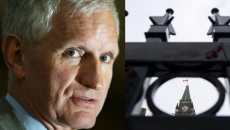In 2021, the Vancouver-based Drug User Liberation Front approached Health Canada with a proposal.
It wanted permission to buy heroin, cocaine and methamphetamine on the dark web, before having the drugs tested for contaminants and selling them to users through its "compassion club and fulfilment centre."
Health Canada rejected the application for exemption from drug laws, saying DULF's plan presented too many public health and safety risks — but the group went ahead with it anyway, saying it would save lives.
The unsanctioned operation would trigger a political firestorm, arrests and constitutional challenges.
Lawyers for DULF are now waiting to hear if a judge will agree that Health Canada violated drug users' Charter rights when it refused to grant the exemption, while DULF prepares a second Charter challenge as part of its defence of its two co-founders, Eris Nyx and Jeremy Kalicum, who were arrested and charged with possession for the purpose of trafficking.
The court cases keep British Columbia on the cutting edge of the legal landscape around drug use and understanding of Canadians' constitutional rights, more than a decade after a landmark Supreme Court of Canada decision that kept Vancouver's Insite safe injection site open.
But one expert says that while the 2011 Insite decision set some key precedents, applying that decision to the DULF case is not necessarily straightforward.
Margot Young, a professor at the Allard School of Law at the University of British Columbia, said it's difficult to know how the Insite decision will affect the DULF cases, particularly since Insite did not address selling of drugs.
She said the Insite ruling is often seen as site-specific to the work Insite does.
"That's been of some concern with respect to opening other safer injection sites across Canada, although it has happened, and Insite does lead the way for that," she said.
"But to say that there's an easy, transference of Insite to this circumstance, I think is probably not right."
The DULF cases come amid a growing push in B.C. for new approaches to a drug toxicity crisis that has killed more than 14,000 people since the province declared a health emergency eight years ago. Both provincial health officer Dr. Bonnie Henry and former chief coroner Lisa Lapointe have called for alternatives to street drugs to be made available without a prescription.
A report from Henry last week cited DULF's compassion club, and academic research on its outcomes.
Young, who focuses on the intersection of social justice and constitutional law, said the DULF cases are among the latest to explore what it means to have the protected right to "security of the person," beyond the risk of criminal prosecution.
"How can we say someone has security as a person, if they can't access a safe supply of drugs that they need for the health condition of addiction?" she said.
In the Insite ruling, the Supreme Court of Canada ordered the federal minister of health to continue exempting Insite, which allows users to inject their own drugs under the observation of trained professionals.
The country's top judges ruled the risk of death for Insite users if the program were to stop "is grossly disproportionate to any benefit that Canada might derive from presenting a uniform stance on the possession of narcotics."
Young said courts had repeatedly rejected the moral blame that traditionally attaches to individuals who use drugs.
"The (Supreme Court) recognized that addiction is a health issue. It's not an issue of moral culpability, or a wilfulness or individual choice. It's a health issue," she said.
"And that means that this larger context is one not of where you're dealing with individuals who have a particular lifestyle, or they're just making bad choices, but you're dealing with individuals who have health issues."
PUSHING 'BARRIERS' in B.C.
DULF's work was not conducted in secret. The group described what it was doing on its website, issued press releases and held news conferences.
In a press release issued on Sept. 20 last year, the group said: "For one year the Drug User Liberation Front has operated an illegal heroin, cocaine and methamphetamine compassion club pilot study."
It said on its website it had sold three kilograms of the drugs to compassion club members "for up to 80 per cent cheaper than they would (pay) on the street."
It said that among 42 participants there had been zero known deaths resulting from the substances provided by the club.
Subsequent peer-reviewed research was published in the International Journal of Drug Policy, with Nyx and Kalicum as co-authors. It said enrolment in the compassion club was associated with a 49 per cent reduced likelihood of non-fatal overdose, and a 63 per cent reduced likelihood of non-fatal overdose involving naloxone administration.
But the announcements by DULF triggered criticism in the B.C. legislature from the Opposition BC United — DULF's operations had been funded, at least in part, by government money. Solicitor General Mike Farnworth said the contract granted to DULF was to save lives, not to buy drugs, and when the government found out it had been doing so, the contract was cancelled.
He said the contract was for "drug testing."
On Oct. 26, Vancouver police shut it all down.
Officers raided the compassion club and arrested Nyx and Kalicum. The pair would later be charged with multiple counts of possession for the purpose of trafficking.
Tim Dickson, who represents DULF, said its request for a judicial review of the Health Canada decision represents a "highly practical application of constitutional law" at a time when the politics around drug use are "very, very difficult."
"We have seen a sort of coalescing of views of some political parties, a number of political parties, in clamping down on harm reduction and putting the convenience of the public first, and not prioritizing methods to protect the lives and safety of drug users," he said.
"And in that kind of political environment, constitutional rights obviously become far more important, because they set up limits on the policies that can be implemented by the government," he said.
He argued in Federal Court in March that the exemption rejection violated the Charter rights of people who use drugs because it impeded their right to life and liberty, and punished people who are addicted.
In an interview, Dickson said the Insite ruling established that it is constitutional to prohibit possession and trafficking of drugs only if there is an exemption process.
He argued that in DULF's case, Health Canada ruled out any possibility of a compassion club without taking a close look at the various interests, including those of people who use drugs.
"It can't draw just these such bright lines without actually considering the merits of what is being proposed," he said.
"And it definitely has to take into account the constitutional rights issue and it didn't do those things."
Dickson said he is also preparing to make a Charter challenge related the criminal charges against Nyx and Kalicum.
Young said a Charter challenge in the criminal case would argue that illicit street drugs are so toxic that putting people at risk of jail for providing uncontaminated drugs would infringe upon the life, liberty and security of drug users.
In a situation where there was no guarantee street drugs were not toxic, "to prevent remedy of that, which is what the compassion club is trying to do, is actually contrary to the stated goals of the (law), which is public health," she said.
Health Canada said it would not comment on its case involving DULF while it waits for a decision from the court.
The Public Prosecution Service of Canada said it would respond to a Charter challenge in the criminal case when it is filed by DULF's lawyers.
Both Henry and Lapointe have said B.C. cannot prescribe its way out of the toxic drug crisis, and support consideration of non-prescribed access to drugs including opioids.
Their calls were swiftly rejected by the provincial government. Premier David Eby said last week there was a "zero per cent chance" the recommendations would be implemented.
But Dickson said B.C. has a history of finding new ways "for reducing the harms of drugs, and there are people willing to push those barriers."
He said the province had long been "ground zero for overdose epidemics" leading to various court challenges in response.
"(The) Insite (court challenge) came out of an earlier overdose crisis in the '90s and DULF is coming out of this current overdose crisis," he said.





